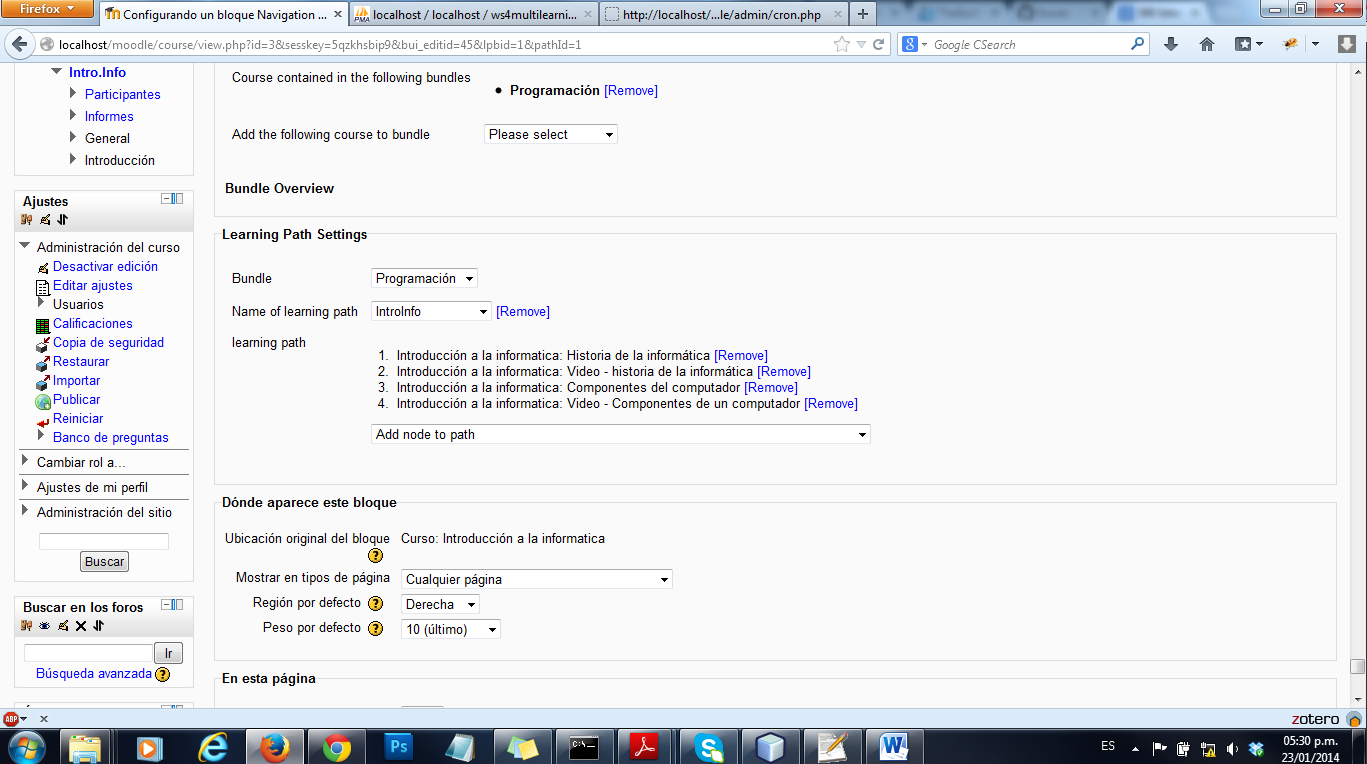-
Notifications
You must be signed in to change notification settings - Fork 1
New issue
Have a question about this project? Sign up for a free GitHub account to open an issue and contact its maintainers and the community.
By clicking “Sign up for GitHub”, you agree to our terms of service and privacy statement. We’ll occasionally send you account related emails.
Already on GitHub? Sign in to your account
context_course not found #3
Comments
|
I think I know what is the problem (http://docs.moodle.org/dev/Page_API#Context) // Moodle 2.2 and greater uses // Moodle 2.0 and 2.1 |
|
Hi Andre, I have some questions related to DASIS but these are for my undergraduate thesis, I sent you an email with an attachment, you could read it and give me a little help?, It's nothing technical. I sent it to: [email protected] Cheers!, Fabian |
|
Hi again, the email could not be delivered, then I write it all here ... The reason that I wrote you, is because I need your help with some little questions I have. My full name is Nestor Fabian Peña Estrella, I'm a student of computer engineering at University of Cauca in Colombia (email: [email protected], my university web page: www.unicauca.edu.co), I am doing my undergraduate thesis and is related to learning styles. I understand that you consider the Felder-Silverman Learning Style Model, but I don't know if this project uses navigation and content adaptation, or just navigation adaptation. What are you adapting related to Learning styles? It's possible to make your plugin take into account topics as nodes? If yes, every topic node could be composed of a group of different resources or activities about the same topic? for example: the topic is "regular expressions" then this topic could contain the following resources "regular expressions(text)", "regular expressions(video)", "regular expressions(audio)"; if the learning style of the student is more visual than verbal, then the plugin only shows video content. Maybe a graphic explanation is clearer… Then finally the important question... |
|
(TopicA) (TopicA)---(TopicC) When click on TopicB, the content is adapted according the learning style? |
|
Hi Fabian, thanks for your email notice. I changed my server and some things are still not done… I developed the plugins at the LMU University in munich, germany. I also did a little study to examine the interdisciplinary navigation between courses: http://advan.physiology.org/content/36/4/284.long How it works: Adapation (block case repository) works with case based reasoning. That means that every navigation step (and series of steps) of students is tracked and stored in cases. Also test results are tracked. If a new student is thinking whats his best next navigation step, the adaption searches for previous students with an similarly navigation path and mostly the same user preferences and then choses the step of the one student with the best test result. This result is visualized by the node color (link annotation). The more informations about the user and learning objects are known, the better adaptation can work. This way adaptation is not always correct but will be better with increasing number of cases in the case repository. And you don’t need complete metadata of all activities and users to let the adaptation work. Generally the semantic web connects moodles „mods“, means activities. I think you want to display only the contents with best fitting to users learning style and hide the others. My plugins can’t do that. You maybe have to be aware of reduce users control of navigation. Some users could dislike it to get the contents chosen by the machine and be afraid of missing some important learning contents because of this decisions out of the „black box“. The learning path function of the semantic web could to that job. You can choose the adaptive path (direct guidance), which means that the next button brings the user to best next node of the navigation web. First of all adaption you have to collect cases. Without cases to compare the adaptation will not work. In the semantic web block preferences you can select „collect cases“ without link annotation for users. Because I didn’t completed experiments with adaptive features of my plugins I can’t say whats the minimum amount of cases in the repository. I hope, this was helpful for you! Best wishes, Andre Am 25.01.2014 um 00:31 schrieb fabianp60 [email protected]:
|
|
thanks for your help and your good advice, I'll keep that in mind Greetings, Fabian |

Hi Andre, I shame to bother again :( ... but I have a problem trying to "Edit Metadata", I created the Bundle and the Path, but when I click on "Edit Metadata" shows me the following error:
Fatal error: Class 'context_course' not found in C:\wamp\www\moodle\blocks\semantic_web\Metadata\edit_metadata.php on line 85
I've tried different browsers but show the same, I attached a couple of screenshots to you, maybe you could help me

The text was updated successfully, but these errors were encountered: